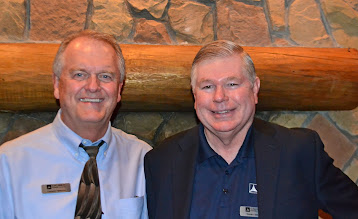![]()
Sales Team Issue #8 – Sales Team Synergy
Quite simply, another way of
explaining this issue is to say Team Unity. As sales team members and sales
leaders, we all understand that every person is going to handle their job
responsibilities in slightly different ways. This is typically based on their
personalities, past training, level of experience and how they understand management’s
instructions.
As a sales leader in your
organization, it is a good idea to have diversity, however it is a great idea
to have unity. Unity is driven by an understanding of the company’s Vision and
Mission statement, the quality of the leadership provided, equitable
compensation, team successes, recognition, authority granted, humility, a
quality organization, and excellent products. Your vision and mission should be
privately communicated and publicly displayed throughout the company’s
facilities.
Whether you are a solo
operator or a large team leader, it will be imperative to coach your associates
on the importance of contributing to the company’s vision with every activity.
If the proposed activity does not contribute to the vision, then it should be
eliminated. These mission-based activities can be very diverse. The depth of
expertise required will frequently demand working with other disciplines inside
your organization, or possibly retaining that expertise outside from a
contractor. As salespeople, we rely on manufacturing, operations, IT,
logistics, product development, other departments, and people that have
knowledge and responsibilities beyond our scope.
Your coaching should be
thorough and consistent as you work to drive home the individual culture that
creates unity.
The culture creation that
creates unity should include training on every aspect of the sales team’s skill
set. People appreciate the investment in their career and professional
expertise. This appreciation is part of the loyalty you will receive from your
team as they realize your interest in their success.
No matter the angst it might
create, accountability and sales metrics are also part of the mix. Salespeople
want to be treated fairly and equitably.
Metrics tied to compensation
plans should allow for fair treatment to both the employer and employee. Metrics
that become punitive to the salesperson because they exceed quota, should be
discarded for a better system.
Practicing favoritism can
quickly create divisions and instigate anger in the individual performers. The
way people are evaluated should be clearly communicated to everyone involved.
Ultimately this level of consistency helps your team understand they are an essential
part of an organization they can be proud of.
Sales leaders must always be
mindful of the fact that any individual will base their decision to stay and
contribute upon the potential of the company to provide a viable future for
them. Consequently, care must be taken with praise, reprimands, the timing, and
quality of their reviews to ensure that each individual feels valued as a key
contributor to the success of the company.
Recognition for a job well
done is a viable way of creating unity with your team. If everyone has a
win-win mentality, then seeing one of their peers receive an award should
motivate them to a higher level of performance.
Another aspect of synergy is the
personal authority given to an individual who has earned the freedom based on
past performance and wise decisions. By delegating authority, the sales team
leader can spend more time working with the less experienced associates to help
them achieve mastery in their job functions.
Every company should strive to
have the right frequency of team meetings with the salespeople to promote
information transfer, company directives, and allow best-way information to be
shared among the sales team. Meetings should be timely and not be held just for
the sake of having a meeting. Seriously consider having strict time limits, a
written agenda communicated in advance, and key action plans generated as a result
of the meeting. Meetings should keep the team on the correct track (Policing
deviations), which contributes to the unity of the team.
Having friendly competitions
between teams and individuals can add a little spice to the competitive spirit
normally found inside people oriented toward a sales occupation. The
combination of the public competition and rewards can add a lighthearted,
energizing effect to the attitudes of the individuals on the sales team.
The quality of your products
is always an impactful aspect of the morale, productivity, and unity of the
salespeople. Personally, I have left several long-term employment situations
when the quality of the products and services declined to the point that I did
not want to experience the grief from my customers over poor quality. This can
be a fundamental aspect of retaining or losing the synergy that the company has
worked diligently to build.
In summary, it is important to
put some thought and energy into the unity of your organization for the sake of
productivity and the impact it will have on your customer base. Every customer
should be able to conduct business with one of your locations and expect to
receive a very high level of effectiveness, efficiency, and service
consistently across the board.
A last footnote to this
section should not be neglected. Hiring well, and through onboarding is going
to be a critical aspect of the synergy created in your organization. Applicants
should be screened not just for sales abilities, experience, and education, but
also the attitudes they will bring to the job. The attitude of strong
confidence in conjunction with the humility to accept orders will carry the
employee and the company a long way.
Do your utmost (I strongly
suggest pre-employment screening tests) to hire people with a strong propensity
for sales and a driving personality focused on excellence.



